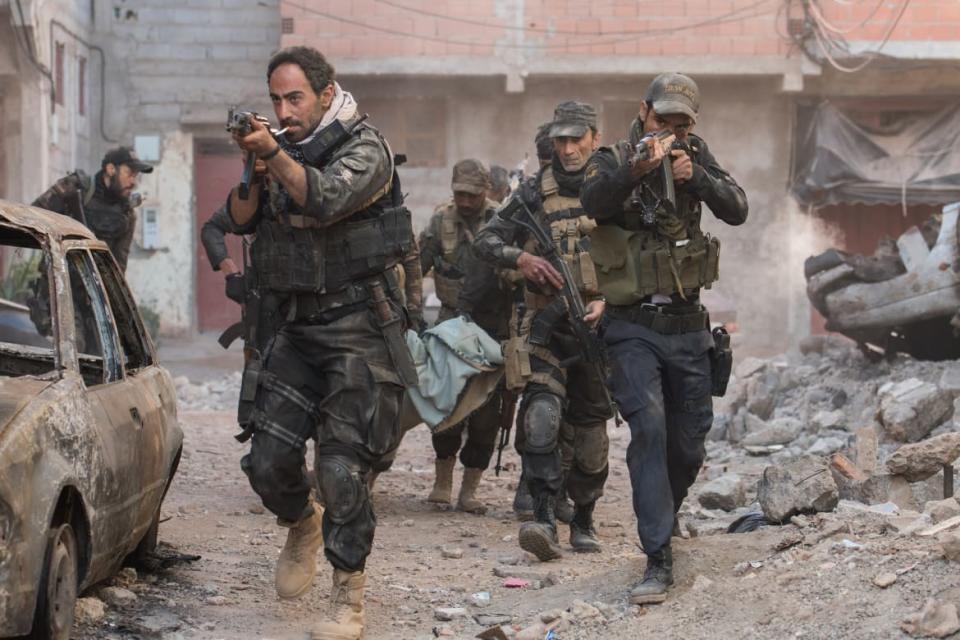‘Avengers: Endgame’ Directors’ Next Battle: Taking On Trumpian Islamophobia

At this year’s Venice Film Festival, nestled amid Joaquin Phoenix’s deranged star turn in Joker, Adam Driver and Scarlett Johansson’s scenery-chewing clashes in the divorce saga Marriage Story, and the gross spectacle of critics deigning to applaud child rapist Roman Polanski’s latest (about a wrongfully-accused man, naturally), came a thrillingly-heroic epic populated by a cast of unknowns that was, in this writer’s estimation, the most crowd-pleasing movie of the fest.
Marking the directorial debut of Matthew Michael Carnahan, Mosul tells the remarkable true story of the Nineveh SWAT team—an elite group of Iraqi soldiers fighting like hell to reclaim their fallen city from ISIS. All of the men in the unit are on a mission of vengeance, as its sine qua non is you must have lost a family member to ISIS in order to join. You can practically feel the bullets whizzing by as Carnahan drops you right into war-torn Iraq where Kawa (Adam Bessa), a 21-year-old police officer, is left with no other choice than to join Col. Jasem (Suhail Dabbach) and his SWAT team after barely eking his way out of a deadly firefight.
“For us, we can say this is the first film to represent Arabs in a positive way, Iraqis in a positive way and Muslims in a positive way. In war movies, there’s the American Sniper problem: You never see what’s on the opposite side,” says producer Mohamed Al-Daradji, himself kidnapped by Iraqi insurgents in the early aughts, who handled the logistics of the Marrakech film shoot. “We’ve never had a chance to represent ourselves at this level.”
In addition to Al-Daradji, Mosul is produced by the two biggest filmmakers in the world right now: Anthony and Joe Russo, aka the Russo Brothers—the director duo behind the Marvel superhero blockbusters Captain America: The Winter Soldier, Captain America: Civil War, Avengers: Infinity War, and Avengers: Endgame, the last of which recently eclipsed Avatar to become the highest-grossing movie of all time. It’s the first film to be released by their independent film studio AGBO, and is eyeing a domestic distributor for an Oscar-qualifying run in December.
Joaquin Phoenix on His Joker Transformation: ‘You Start to Go Mad’
The Daily Beast sat down with the Russo Brothers at the Venice Film Festival to discuss their new film and why we need more diversity on screen—especially in the age of Trump.
So, Mosul is the very first movie out of the gate for your film studio AGBO.
Joe Russo: Yes, the first movie out of the gate is this film. Hopefully it defines the direction we want to move as a company, which is telling compelling stories no matter where they come from, because narrative is a great unifier. We saw with Marvel films the way stories can bring people together around the world and they can also tell a different perspective. We’ve had a hundred years of western-Hollywood-white-movie dominance. It’s going to be interesting, now that people seem to be available and ready, to hear all kinds of other stories.
One of the commendable things about this film—and there are several—is that it does give us Arab heroes, something this is in painfully short supply in Hollywood.
Joe Russo: It’s critical, because you reinforce either negative or positive ideas about representation if you tell the same kinds of stories over and over again. If these actors can only ever walk in a room to audition for a terrorist, then that is without question going to reinforce the way people perceive their culture.
As a kid growing up in the ‘90s, pretty much the only time we saw Arab characters in Hollywood films were playing terrorists. I grew up with Executive Decision and True Lies, and the Arab terrorists in True Lies are members of “Crimson Jihad,” just this comically absurd terrorist organization.
Joe Russo: Villainous cartoon characters.
Anthony Russo: And look, there’s an enormous creative upside here, too. As a storyteller and as a filmmaker, you’re always looking for new ways to bring new stories to the screen, new ways to engage audiences, new ways to surprise audiences, so what happened there in Mosul was so specific and so unique in the way the warfare played out there, and the complexities the characters had to deal with in terms of their allegiances, and who they were fighting against, and how they were fighting against them, that they had a very unique human experience happen. Nobody’s ever seen those dynamics together in a war movie before, or this story happen on screen before.

A scene from Mosul
Many Americans—purely out of ignorance—view the conflicts in the Middle East broadly as this us-versus them, Christianity-versus-Islam thing. But in Mosul, by humanizing the Muslim fighters, it could help combat Islamophobia stateside.
Joe Russo: I think media is the most powerful tool for combating Islamophobia, and for combating racism. People can feel things emotionally—something that can override their brain. One of the great myths that was ever perpetrated is that there are multiple races. There are not. There is one race: the human race. Everybody looks exactly the same on the inside, and the most superficial criteria for trying to define a difference between people is pigmentation of the skin. It sounds insane. Those are the barriers that we have to break down.
Or in the Quillette world, the shape of one’s skull. I’m kidding, of course.
Joe Russo: Right. Whatever ridiculous criteria you’re trying to use to define it, our job as storytellers is to break that down, to educate, and to show stories where everyone is human, and how we can all relate to one another. What’s so tragic about what happened in Mosul is, this wasn’t even their war! It’s a war that we started—and then we left. We left them to pick up the pieces with a bunch of radicals who aren’t even from their country, and they have to drive them out, and their families are being raped and killed. It’s a harrowing, harrowing story about heroism and the dignity of the human spirit, and everyone can relate to that no matter who you are.
With movies like American Sniper, or to a more extreme degree Green Berets, there’s this history of war films in America being incredibly jingoistic, one-sided, and borderline recruitment tools.
Joe Russo: They’re like sports movies, right? It’s a specific genre whose intent is to rouse the audience.
Anthony Russo: It’s kind of funny because that’s basically the nature of warfare, right? It’s one side versus another, with no compromise. It’s the nature of the beast.
Joe Russo: Just like sports: Your team is the good team. It’s a very reductionist take.
One thing I admire about you guys is you’re the rare Hollywood filmmakers who take on the military-industrial complex. I think Winter Soldier is maybe the best MCU movie, and it’s the first one that was critical of military overreach. With Iron Man audiences were lauding a weapons manufacturer, but Winter Soldier offered this dystopic vision of drone warfare.
Anthony Russo: It’s great to hear you mention Winter Soldier in that context, because perhaps the most gratifying moment in all our Marvel work came after when we were in a country that is not as free as other countries, and somebody came up to us and said, “I love this movie because this movie could not be made here since it criticizes the government. We can’t criticize the government.” To have people feel empowered by this dynamic was so exciting. I don’t know where it comes from. Even though our grandparents come over from Italy to the United States, our family’s always maintained this immigrant mentality, so we were just brought up to think of America as a country of immigrants—that people come from all corners of the world, and some people come from very difficult places. When our family left the South of Italy, it was a very poor, difficult area that was wrecked by the wars of the 20th century. So, I think it comes from this knowledge of global migration, and the fact that America presents an opportunity for freedom, especially freedom of expression, and we want to both celebrate that and hold America to the fire.
It’s ridiculous how you can’t really criticize the military in America without having your ass handed to you. Everyone should want it to aspire to be better, no?
Anthony Russo: There are people high up who make very serious decisions in our country, and sometimes they make very bad decisions. You can’t just cover up a bad decision because you don’t want to look bad!
Joe Russo: Power is intoxicating and that’s dangerous. As we’re seeing right now, when people get their hands on power they can abuse it in all kinds of different ways, so we have to be very careful about how much power we do allow them. Right now we’re seeing that we need a few more checks and balances within the U.S. government to prevent abuses of power.
Got a tip? Send it to The Daily Beast here
Get our top stories in your inbox every day. Sign up now!
Daily Beast Membership: Beast Inside goes deeper on the stories that matter to you. Learn more.

